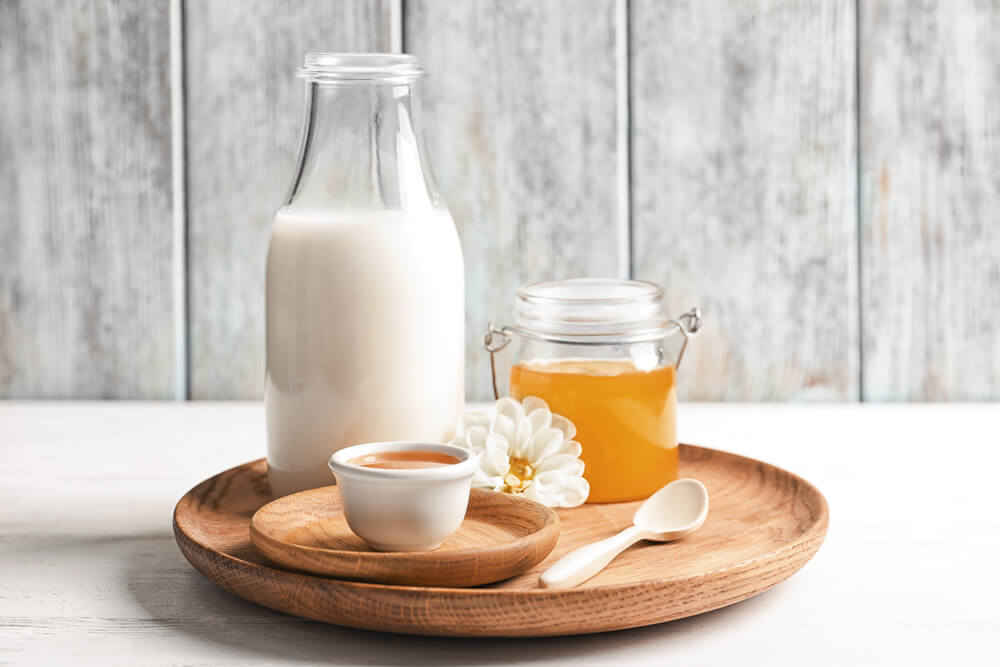How to Get Rid of Cough Using Natural Remedies
A cough is caused by an irritant that tickles and irritates your larynx, and your body reacts to it by reflexively contracting muscles to expel it out. Looking for How to Get Rid of Cough?
Getting a cough is very common. Cough is instead, very helpful in clearing the throat from irritants, mucus, and phlegm. However, constant coughing can be a reason for other serious conditions like a viral infection or an allergy.
It is not necessary that cough can be a symptom of some condition related to the lungs. Sometimes(1), GERD – a gastroesophageal reflux disease, can also be a reason for the cough.
There are a number of ‘over-the-counter’ medications to treat a cough that can be a result of allergens, cold or a sinus infection. If you have a cough caused by a bacterial infection, you can take antibiotics.
If you prefer natural ways of treating your cough, mentioned below are the best natural remedies, home remedies, essential oils, herbs, and foods & drinks that can help you treat this condition at home and provide you exceptional relief.
Table of Contents
Did you know?
|
- Home Remedies
- Foods
- Herbs
- Essential Oils
- How to Prevent
CURE 1: Home Remedies for Cough
People just don’t need simple home remedies to cure cough alone. They look for simple homely treatments to boost their immune system and help the body fight off what’s causing cough as well. That’s where natural home remedies come in.
1. Honey for cough

How to use
Ingredients
- Teaspoons of 2 Honey
- 1 glass Warm water
- ½ teaspoon Cinnamon Powder
Procedure – 1
- Take a glass of warm water
- Add 2 tablespoons of honey to it
- Stir well
- Sip this solution slowly
Procedure – 2
Mix ½ a teaspoon of cinnamon powder to a teaspoon of Honey and swallow just before going to bed.
How many times
Drink the solution of warm water and honey three times a day or swallow the mixture of Honey(3) and Cinnamon powder only once a day before going to bed.
Benefits
Honey has oil content and some mild alcohol like compounds that help in alleviating cough. It promotes better sleep by getting rid of phlegm.
2. Ginger for Cough
How to use
Ingredients
- 1 inch Ginger (Grated into small pieces)
- A pot or kettle
- Half liter distilled water
Procedure
- Boil half a liter in a pot or a kettle
- Add the grated ginger pieces to it
- Let the water seep through the ginger piece for about 5 to 7 minutes
- Drink this solution
How many times:
You can drink this solution twice daily. Once in the morning and once before going to bed. You can even add honey to this solution.
Benefits:
Ginger has antioxidant and anti-inflammatory properties that lessen allergic responses by decreasing IgE levels. Ginger provides a smooth airway, relaxing muscles and breaking down mucus.
Also Read: 6 Natural remedies with ginger for your skin health
3. Mullein Tea for cough

Mullein tea is a traditional remedy for many ailments related to the respiratory tract as it is very effective in clearing mucus from the lungs and irritation from the throat.
How to Use
Ingredients
- 1 cup distilled water
- 2 teaspoons mullein leaves (Dried)
- A bowl to boil the water
Procedure
- Add 1 cup water to a boiling bowl
- Heat the water till it boils
- Add 2 cups of dried mullein leaves
- Let it steep for about 10 minutes
- Strain out the leaves
Drink this tea to get an immediate relief
How many times:
You can have this tea thrice daily.
Benefits
Mullein has ‘saponins’ which help to loosen the phlegm and also offer a soothing effect to the sensitive mucous membranes.
CURE 2: Foods for cough
1. Milk, Honey & Ginger for cough

How to use
Ingredients
- 1 glass of milk
- 1 teaspoon fresh ginger paste
- 1 teaspoon Honey
- A small bowl to heat milk
Procedure
- Add 1 glass of milk to a heating bowl
- Heat the milk till it boils
- Add 1 teaspoon of fresh ginger paste to it
- Stir well
- Turn off the heat
- Add one teaspoon of honey to it
- Mix well till the honey dissolves completely in the milk
Drink this mixture by sipping it.
How many times:
You can drink this mixture 2 to 3 times a day.
Benefits:
The inflammation and irritation in the throat often lead to uncomfortable and whooping cough, and difficulty in breathing. Drinking this mixture soothes all these issues and provides immense relief to the person almost instantly.
2. Honey for Cough
Honey is used as a medicine from centuries as it has antibacterial properties. As it soothes the irritated mucous membranes, it proves to be an effective remedy for treating cough.
How to use
Ingredients
- 1 cup distilled water
- Half a wedge of lemon
- 1 tablespoon Honey
- A heating bowl
Procedure
- Add one cup distilled water to a heating bowl
- Heat the water till it boils
- Transfer the water to a cup
- Squeeze half a lemon wedge to it
- Add 1 tablespoon of Honey
- Stir well till the honey dissolves fully
Sip this tea
How many times
You can have this tea 2 to 3 times a day
Benefits:
Honey soothes irritated mucous membranes and provides relief almost instantly. Lemon acts as an expectorant.
3. Fruits and Vegetables

Many vegetables and fruits are rich sources of antioxidants and other nutrients that strengthen your immune system and shield the body against diseases and infections. Include the following foods in your regular diet and treat cough more effectively.
Citrus fruits, red grapes, berries, leafy greens, broccoli, tomatoes, bell peppers. Cantaloupe, winter squash, and sweet potatoes.
Drinks for Cough
1. Apple and Onion for cough
Onions are a part of everyday food. They add a lot of taste and flavor to food. Apart from this, onions can also treat someone suffering from cough and provide great relief.
How to use
Ingredients
- 1 Tablespoon canola oil
- 2 medium yellow onions, sliced
- 1/2 Tablespoon fresh rosemary, chopped
- 1/2 Tablespoon fresh thyme
- 3 apples, cut into small pieces
- 4 cups of broth (Vegetable or chicken)
Procedure
- Heat the oil in a medium saucepan over medium heat.
- Add the onions and sauté until golden.
- Pour in the broth and bring to a boil over medium-high heat.
- Add the apples, and reduce the heat to medium-low.
- Simmer for 10 minutes.
How many times: You can have this soup 2 times a day.
Benefits: Onions can be used as an effective home remedy to cure cough, sore throat, high fever, cold and flu
2. Chicken Soup

Chicken soup is one of the best remedies to treat cough sore throat, reduce congestion and loosen the mucus. Chicken broth or soup flushes out toxins from the body. It also strengthens the immune system and repairs the tissues.
3. Tomato Soup
Tomato is rich in vitamin C. This helps in reducing mucus formation when you have a cough. The best way to consume tomatoes is in the form of a soup. Have tomato soup at least 2 times a day by adding some freshly ground black pepper to it. This is a very good way of treating cough.
CURE 3: Herbs for Cough
Turmeric for cough
Turmeric has a compound called Curcumin which has anti-inflammatory properties. This makes Turmeric one of the effective and ‘easy to lay hands on’ remedy for treating cough.
How to use
Ingredients
- Turmeric – 1 Tablespoon
- Hot water – 1 glass
- Salt – As per taste
Procedure
- Take a glass of hot water
- Add 1 tablespoon of turmeric to it
- Add Salt as per your taste
- Stir well to form a uniform solution
- Drink this like tea
How many times
You can have this solution 2 times a day.
Benefits:
Having this just before going to bed relieves cough very effectively and quickly.
Also Read: Proven Health Benefits of Turmeric
Herbal Tea for Cough
1. Thyme for cough

How to use
Ingredients
- 1 cup boiling water
- 1 teaspoon honey
- 1 teaspoon dried thyme
Procedure
- Pour the boiling water into a large mug
- Add t1 teaspoon dried thyme to it
- Cover the mug
- Allow the tea to steep for 10 minutes.
- Add 1 teaspoon honey
- Mix well
- Relax and drink the tea slowly while inhaling the steam.
How many times:
You can drink this up to four times per day.
Benefits:
Thyme help open your airways and relax the muscles in your chest so that you can breathe easier and reduces cough to a considerable extent.
2. Garlic for cough
Garlic has been used as one of the best remedies for treating cough. Garlic has a compound called allicin which is antiviral and antibacterial.
How to use
Ingredients
- 3 Cloves of fresh garlic
- 1 glass of milk
- 1 teaspoon Honey
- A bowl to heat the milk
Procedure
- Peel 3 cloves of fresh garlic
- Finely chop them and keep aside
- Add a glass of milk to a bowl and heat it
- Turn off the heat and transfer the milk to a glass
- Add the finely chopped garlic to the milk
- Add 1 teaspoon honey and mix well till the honey dissolves completely
Drink this mixture for getting relief from the inflammation and constant irritation caused by a cough.
How many times:
You can drink this 2 times a day.
Benefits:
Garlic inhibits the growth of viruses and treats infections very effectively. The common breathing difficulty associated with a cough is also gradually brought down by using garlic.
3. Ginger for cough

Ginger is a root that has a strong flavor and a lot of medicinal properties. It has been used from ages now for treating various ailments like cough, cold, motion sickness, flu, stomach upset and inflammation. It also strengthens the immune system.
How to Use
Ingredients
- ½ teaspoon of finely grated ginger
- ½ teaspoon Black Pepper powder
- ½ teaspoon whole cloves
- 1 teaspoon Honey
- 1 glass distilled water
- A bowl to boil the water
Procedure
- Add a glass of distilled water into a bowl
- Put in on the stove and turn on the heat
- Add ½ teaspoon of finely grated ginger
- Add ½ teaspoon Black Pepper powder
- Add ½ teaspoon whole cloves
- Let the whole mixture boil
- Turn off the heat and steep the mixture into a drinking cup or a glass
Drink this solution for relief from cough, throat inflammation, and irritated throat.
How many times:
You can drink this solution 2 to 3 times a day.
Benefits:
The anti-inflammatory and immune boosting properties of Ginger help in reducing irritation and inflammation in the throat. It also can suppress allergic reactions. It activates macrophages in white blood cells and thus boosts the immune system. Apart from this, it also provides a soothing effect on the irritated and painful throat which are caused due to severe coughing.
CURE 4: Essential Oils for Cough
Our exposure to polluted air in the cities and sustained inhalation of it increases our chances of contracting many diseases and worsens the symptoms of cough(3).
Essential oils have a variety of natural sources which help cure a cough faster. Extracted from natural plants, they are volatile hydrophobic compounds with a distinctive aroma.
1. Tea Tree Oil for cough
Tea tree Oil has bronchodilatory effects. It also has anti-inflammatory properties and helps reduce cough significantly.
How to use
Ingredients
Vaporizer
Tea tree Oil
Procedure
Add 4 to 5 drops of Tea tree oil to your Vaporizer
Inhale the steam taking deep breaths for at least 2 minutes
How many times
Do this once a day just before going to bed.
Benefits
The THC that is found in tea tree oil dilates the respiratory air passages and inhibits constriction, which is the major problem of cough patients. In addition, Tea tree oil also protects the lungs when orally ingested or inhaled. It clears the mucus, opening the air passages and makes breathing easier.
Also Read: Amazing Benefits and Uses of Tea Tree Oil
2. Eucalyptus Oil for cough

Eucalyptus Oil is a great choice for treating cough as it can help open up the airways, thereby reducing restriction.
How to use
Ingredients
- Hand Towel
- Eucalyptus Oil
Procedure
- Put 4 to 5 drops of Eucalyptus oil on a hand towel
- Place it beside you while sleeping
- Make sure you place close enough for you to breathe the aroma
How Often
Use this remedy every night to relieve the cough and to promote better sleep.
Benefits
Eucalyptus Oil is an effective remedy for relieving congestion and blocked nose. It also helps in breaking down mucus, thus reducing cough.
3. Peppermint Oil for cough
Peppermint oil comes from a hybrid plant of spearmint which is native to Europe and the Middle East, and effective in treating respiratory related problems.
How To Use
Ingredients
- 4 to 5 drops of Peppermint Essential Oil
- 1 liter distilled water
- A clean towel
- A bowl to boil water
Procedure
- Add 1 liter of distilled water to a bowl
- Heat the water till it boils
- Turn off the heat
- Add 4 to 5 drops of Peppermint essential oil to it
- Mix well
- Cover the bowl with a clean towel with your head inside it
- Make sure that no steam escapes
Inhale the aroma without touching the bowl
Benefits:
Shortness of breath is one of the most common symptoms of cough. The menthol in peppermint acts as an antihistamine and helps relieve blocked noses and a stuffy respiratory tract which results in a more natural way to breathe for patients having a severe cough.
How to Prevent Cough
Avoid close contact
Keep away from people who are sick. When you are sick, keep your distance from others to protect it from spreading.
Stay home when you are sick.
Stay at home and keep away from work, school, and errands when you are sick. This way, you will not spread the infection.
Keep your mouth and nose covered
Cover your mouth and nose with a kerchief or a tissue when coughing or sneezing. It may prevent those around you from getting sick. Flu and other serious respiratory illnesses are spread by coughing, sneezing, or unclean hands.
Clean your hands frequently
Washing your hands often will help protect you from germs. If soap and water are not available, use a disinfectant hand wash or an alcohol-based hand sanitizer.
Practice other good health habits
Clean and disinfect frequently touched surfaces at home, work or school, especially when someone is ill(4). Be physically active, get plenty of sleep, manage your stress, eat nutritious food and drink plenty of fluids.
Coughing mostly aggravates at sleep hours. This happens because of the mucus that drips from the nose into the throat when you lie down. To avoid this, keep your head at a higher position and this will reduce coughing and help you sleep better. In addition to this, follow the above remedies to speed up the treatment process and to get better relief.
And finally, try to breathe through your nose as much as possible. Your nose acts as a natural filter and prevents dirt, dust, and pathogens from entering the respiratory system. Breathing through your mouth will remove this protective filter and also cause the throat to dry more quickly. Moreover, it also irritates the throat and can increase inflammation which will lead to a severe cough.
FAQs
1. What is Whooping cough?
Whooping cough or pertussis is a respiratory tract infection that is highly contagious. Severe hacking cough followed by a high-pitched intake of breath that sounds like “whoop.” are all symptoms of whooping cough.
2. How long should a cough last?
Coughs associated with a cold or the flu tend to last a week or 2, most clear up within about 3 weeks. If it is a viral cough, it may persist for several weeks after a viral illness (Max of 8 weeks), while some coughs persist for longer and are usually a sign of an underlying problem.
3. How do I know if my cough is serious?
A cough is a common cold symptom. If you are coughing up thick yellow or green phlegm, or if you are wheezing, and have a fever of 101 F, having night sweats, or coughing up blood, you need to see a doctor. These may be signs of a more serious illness that needs to be diagnosed and treated.




